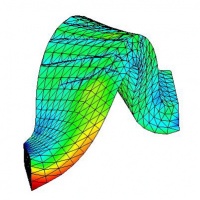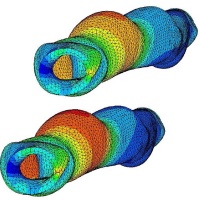(Difference between revisions)
(→syllabus) |
|||
| Line 46: | Line 46: | ||
| tue || jan || 22 || first homework - biopolymers || [http://biomechanics.stanford.edu/me339/me339_h01.pdf h01] || [http://biomechanics.stanford.edu/me339/me339_h01s.pdf solution] | | tue || jan || 22 || first homework - biopolymers || [http://biomechanics.stanford.edu/me339/me339_h01.pdf h01] || [http://biomechanics.stanford.edu/me339/me339_h01s.pdf solution] | ||
|- | |- | ||
| − | | | + | | thu || jan || 24 || biopolymers II - statistical mechanics || [http://biomechanics.stanford.edu/me339/me339_s050607.pdf s05] || kwon |
|- | |- | ||
| − | | | + | | tue || jan || 29 || biopolymers III - gaussian chain || [http://biomechanics.stanford.edu/me339/me339_s050607.pdf s06] || kwon |
|- | |- | ||
| − | | | + | | thu || jan || 31 || biopolymers IV - freely jointed chain & wormlike chain || [http://biomechanics.stanford.edu/me339/me339_s050607.pdf s07] || kwon |
|- | |- | ||
| − | | | + | | tue || feb || 05 || second homework - biopolymers || [http://biomechanics.stanford.edu/me339/me339_h02.pdf h02] || [http://biomechanics.stanford.edu/me339/me339_h02s.pdf solution] |
|- | |- | ||
| thu || feb || 07 || cytoskeletal mechanics I - filopodia - fiber bundle model || [http://biomechanics.stanford.edu/me339/me339_s0809.pdf s08] || kwon | | thu || feb || 07 || cytoskeletal mechanics I - filopodia - fiber bundle model || [http://biomechanics.stanford.edu/me339/me339_s0809.pdf s08] || kwon | ||
Revision as of 21:44, 29 November 2007
Contents |
me309 - finite element analysis in mechanical design
|
ellen kuhl - ekuhl.at.stanford.edu winter 2008 |
goals
grading
- 30 % homework - 3 homework assignments, 10% each
- 30 % midterm - open notes, with calculators, no books
- 40 % project - oral presentations graded by the class, written part graded by us
syllabus
copyright ron kwon, ellen kuhl, chris jacobs, stanford, fall 2007
| day | date | topic | notes | ||
|---|---|---|---|---|---|
| tue | jan | 08 | introduction I - cell biology | s01 | jacobs |
| thu | jan | 10 | introduction II - cytoskeletal biology | s02 | kwon |
| tue | jan | 15 | introduction III - mechanics | s03 | kuhl |
| thu | jan | 17 | biopolymers I - bending & buckling | s04 | kuhl |
| tue | jan | 22 | first homework - biopolymers | h01 | solution |
| thu | jan | 24 | biopolymers II - statistical mechanics | s05 | kwon |
| tue | jan | 29 | biopolymers III - gaussian chain | s06 | kwon |
| thu | jan | 31 | biopolymers IV - freely jointed chain & wormlike chain | s07 | kwon |
| tue | feb | 05 | second homework - biopolymers | h02 | solution |
| thu | feb | 07 | cytoskeletal mechanics I - filopodia - fiber bundle model | s08 | kwon |
| tue | feb | 12 | cytoskeletal mechanics II - red blood cells - six and four fold network model | s09 | kwon |
| thu | feb | 14 | biomembranes I - pipette aspiration | s10 | kwon |
| tue | feb | 19 | cytoskeletal mechanics III - muscle cells - tensegrity model | kuhl | |
| thu | feb | 21 | third homework - cytoskeleton | h03 | |
| tue | feb | 26 | biomembranes II - soap bubbles & cell membranes | s12 | kuhl |
| thu | feb | 28 | biomembranes III - tension, shear & bending | s13 | kuhl |
| tue | mar | 04 | mechanotransduction I | s14 | jacobs |
| thu | mar | 06 | mechanotransduction II | s15 | jacobs |
| tue | mar | 11 | midterm | m01 | |
| thu | mar | 13 | mechanotransduction III | s16 | jacobs |
| fri | mar | 06 | class projects - oral presentations II |
additional reading
(1) boal d: mechanics of the cell, cambridge university press, cambridge, 2002
(2) howard j: mechanics of motor proteins and the cytoskeleton, sinauer associates, sunderland, 2001
(3) alberts b et al.: molecular biology of the cell, garland science, taylor & francis, new york, 2002

